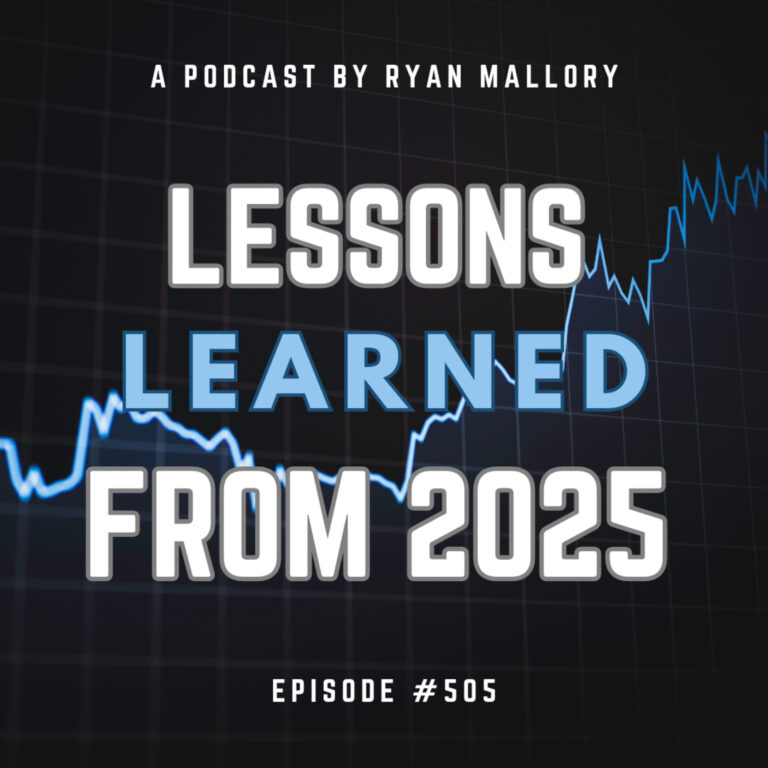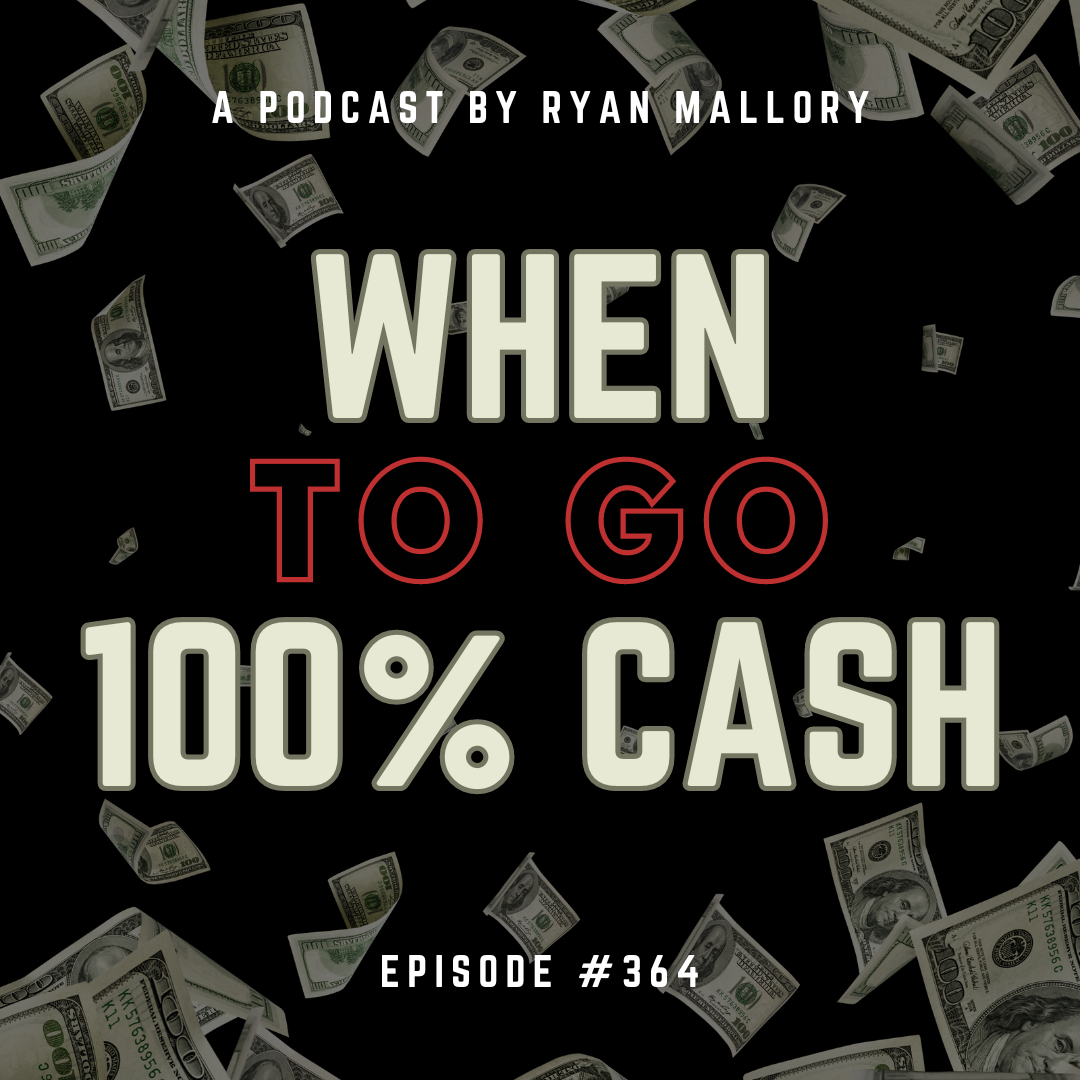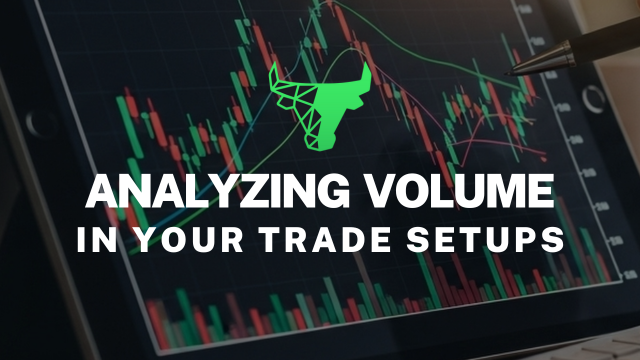Episode Overview
In uncertain times for the stock market, is going all cash as a flight to safety a poor decision? Or should one toughen up and trade through those periods of difficulty? In this podcast episode, Ryan will address the merits of going cash and making sure your long exposure is reflected in the uncertainty of the market overall.
Available on: Apple Podcasts | Spotify | Amazon | YouTube
Episode Highlights & Timestamps
- [0:07] Introduction
Ryan introduces the Swing Trading the Stock Market podcast, discussing trading strategies to thrive in volatile financial markets. - [0:45] Listener Question (Jim Bob Thibodeau)
A listener expresses anxiety about market volatility, asking if going 100% cash is smart or a rookie mistake. - [2:43] When Your Heart Races: Understanding Your Anxiety
Ryan explores why market uncertainty causes anxiety, discussing the role of position sizing and market exposure in managing emotions. - [4:32] Knowing When to Go to Cash
Ryan emphasizes that going cash during uncertain market conditions isn’t a rookie move but a prudent strategy even for experienced traders. - [5:46] Why Holding Through a Downturn Isn’t Swing Trading
Discusses the mistake traders make by holding positions too long during significant market declines instead of managing trades proactively.
Key Takeaways from This Episode:
- Cash Is a Position: Holding cash during periods of high market uncertainty is a wise, strategic decision.
- Position Size Matters: Anxiety often indicates overly aggressive trading or improper position sizing.
- Plan Your Exits: Clearly define your stop-losses and profit-taking points before entering trades.
- Avoid Stubbornness: Refusing to adjust to changing market conditions can severely impact your portfolio negatively.
- Embrace Market Cycles: Accepting that downturns are natural allows traders to approach markets realistically and with reduced emotional stress.
Resources & Links Mentioned:
- Swing Trading the Stock Market – Daily market analysis, trade setups, and insights by Ryan Mallory.
- Join the SharePlanner Trading Block – Get real-time trade alerts and community support.

Take the Next Step:
✅ Stay Connected: Subscribe to Ryan’s newsletter to get free access to Ryan’s Swing Trading Resource Library, along with receiving actionable swing trading strategies and risk management tips delivered straight to your inbox.
📈 Level Up Your Trading: Ready for structured training? Enroll in Ryan’s Swing Trading Mastery Course, The Self-Made Trader, and get the complete trading course, from the foundational elements of trading to advanced setups and profitable strategies.
📲 Join the Trading Community: Sign up for SharePlanner’s Trading Block to become part of Ryan’s swing-trading community, which includes all of Ryan’s real-time swing trades and live market analysis.
Full Episode Transcript
Click here to read the full transcript
0:07
Hey, I’m Ryan Mallory and this is my Swing Trading the Stock Market podcast. I’m here to teach you how to trade in a complex, everchanging world of finance. Learn what it means to trade profitably and consistently managing risk, avoiding the pitfalls of trading, and most importantly, to let those winners run wild.
0:25
You can succeed at the stock market and I’m ready to show you how. Hey everybody, this is Ryan Mallory with Swing Trading the Stock Market. In today’s episode, we’re gonna talk about this stock market correction that has taken place since late July, that peaked out in late July and has sold off for two subsequent months, August and September.
0:45
And the question is simply is, should I be in cash? What should I do? Should I just give up on stock trading? In today’s episode, we’re going to be talking about that. We’re going to be talking about how to deal with some very uncertain times in the market right now, where you got the bonds crashing, you got the yield soaring, you got the VIX wanting to take off again.
1:03
It’s starting to feel a little bit like the early stages of 2022 all over. And today’s e-mail, I got a letter from a guy, he seems a little bit on edge, He’s a little anxious, but he also asks me to give him a good Florida redneck name. So we’re going to call this guy Jim Bob Thibodeau.
1:19
That’s not his real name. I don’t use people’s real names just because I don’t want to come back and haunt them one day. But anyways, Jim Bob, Thibodeau writes.
1:36
Hey, Ryan, All right, I’m kind of freaking out here. Your podcast has been my North Star for a while now. Literally haven’t missed an episode.
1:53
But right now everything in the stock market just seems upside down and sideways to me. I’m staring at my screen heart racing, wondering if going all cash is the only thing that makes sense. It’s like every time I look at a stock, I click on it, I trade it and it just makes my head spin.
2:11
More stocks are plummeting, my portfolios bleeding, and here I am thinking maybe I should just pull everything out and just sit on a cash pile. But is that the smart thing to do or am I just panicking for no reason? I need your wisdom more than ever. Is going all cash and a sell off a rookie mistake or could it be a solid strategy?
2:27
I’m desperate for some clarity here. Oh, and for the fun of it, since I’m asking for advice and all, you can give me a cool Florida redneck name to go by. You know, something that’ll make me smile a bit in these very tense times, waiting on pins and needles for your thoughts. Please help.
2:43
Desperately yours, Jim Bob Thibodeaux. I gotta tell you, I’m his North Star. Desperately his. I don’t know what’s going on here, but stock markets making this guy panic just a little bit here. And I get it. It’s not an easy market at all.
3:06
It’s very difficult. It’s very frustrating. I haven’t made a single trade yet this week in my swing trading portfolio. I’ve been pretty much in cash. And when he uses words like heart racing, I get it. I mean, you can go on a string of trades and even if you have the right position size, it can be kind of frustrating when you’re seeing like loss after loss pile up and the market just doesn’t go anywhere you expect it to go and you get short and the market bounces.
3:23
You get long, the market sells off, and you just feel like you’re just being jerked around needlessly. But you also want to ask yourself if your heart’s racing, what’s the source of that? Could it be because you have too much long exposure in this market? Could it also be because you have too big of a position size?
3:45
Because both of those can contribute to heart racing as well, especially in uncertain times. And so in uncertain times for me, for instance, I’m not going to be 100% long in the market, just there’s no way. Like I said, I haven’t made a trade since last week. I got out of three of my trades. Two of them were stopped out. The other one I just closed out and that was me sitting in a situation where I was 63% cash, 37% long.
4:15
So even there I wasn’t taking on heavy losses because I wasn’t heavily long. And you want really your sentiment towards the market, the certainty of the market should be reflected in how long or how short you are. If you are very confident about this market continuously going up and it’s proven that it’s continuously going up like what we saw over the summer or what we saw in the beginning of the year, then yeah, you can go ahead and get more exposure in your portfolio.
4:32
You can get more long in those times. But then when you’re dealing something right now, it’s really not a bad thing to be cash. Like I said, he mentions this comment in there. Is it a rookie thing to go cash? No, I’m in cash right now. I’m definitely not new to this game, been doing it for a few decades now.
4:55
But sometimes the most rookie thing is when somebody thinks that they have to always be completely long or completely short and they can’t handle the idea of being in cash. Going cash, or knowing when to go cash is probably one of the most important things you can do as a trader. And the more uncertain the market becomes, the better idea it is to have more cash on hand, to not have as many long positions, to be taking profits along the way.
5:12
If you’re sitting on some profits because swing trading, it’s not meant for withstanding a sustained downturn, you get long on a swing trade. You have to believe that the market’s going higher and that the sector that you’re trading in and the individual stocks that you’re trading in are also going higher.
5:28
And yeah you’re going to have like times where you have a one or two or a three day sell, maybe you’ll even have a week sell off. But what we’ve seen here has been a two-month sell off. August and September both down months for the market. Unless something dramatically changes in the next couple days, September will be another down month.
5:46
So with that being said, why would we be swing trading through a downturn? That doesn’t mean that you don’t take some losses during that time, but if you got into stock ABC in July, you don’t hold that stock all the way through August and September when there’s a substantial downturn and there’s been times where the markets bounce.
6:10
For instance, PSX. I got into that one in late August. I sold it here in September, made a decent gain off of it. There’s been other trades where I have not made a good gain. I didn’t make money off of NVIDIA, I didn’t make money off of Micron or DraftKings, but had I gotten into PSX in July and I got let’s say 15% up on the trade and then I just watched that trade fall completely apart in August and September.Well, that’s not really swing trading. I’m not sure what it is. It’s not necessarily longterm trading either. I think it’s stubbornness, stubbornness to get out of a trade and stubbornness. We can really mess you up as a trader if you don’t know when to get out of a trade, when you think that you have to be right on the trade or if you think that you have to endure this kind of sell off.
6:28
And a lot of times where that comes from is you know where the stock once was. You get in a stock at 100, it goes up to $120.00 and it falls back to 115. You want that 20%, you don’t want the 15%, you want the 20. You’re like oh, I know it was just that if it gets back up to that point, I’ll go ahead and close out.
6:43
But it doesn’t. It continues to sell off over the course of the next month and all of a sudden you find yourself maybe sitting at $102 and only a 2% profit. And now you’re thinking, man, I wish I would just sold it at 15%. So it’s like a cycle that you just, you know, keep getting destroyed on.
6:59
And then if the stock continues to sell off, let’s say it goes down to $85 a share, you’re like, holy cow I was once up 20% on this, could have gone out again at 15%, even could have gone out for a 2% profit. Now I’m sitting at a 15% loss. So then you sell it and then it goes right back up.
7:15
You feel that before. I felt it before. I’ve had it happen to me before. It sucks. That’s why going into the trade with a plan in place to know one how you’re going to take profits, two where you’re going to take the loss if the trade goes against you is so incredibly important.
7:33
And so when you’re going through these downturns, you know the stocks that you’re holding in July that had been soarn for a good while, those aren’t really meant to be held through August and September unless you get into a stock like Exxon, which is trading at all time highs right now despite the market trading 7% lower.
7:45
Yeah, those kinds of events can happen and that be a reason to try to hold. But you also want to remember too, you have earnings reports that come out every three months. And so just like earnings reports, if you get in the downturn, there’s no reason to hold through it, just like there’s no reason to hold through an earnings report. You’re taking on too much risk.
8:02
But one thing that you can have and use during the downturn is swingtradingthestockmarket.com. swingtradingthestockmarket.com, it is the service that goes alongside of this patron account. Essentially what you’re going to be getting, you’re going to be getting all my stock market research each and every day.
8:25
That’s going to include updates on all the big tech stocks, updates on all the stock market indices like the S&P 500, the NASDAQ 100. You’re going to get updates on the bond markets because that’s really important right now. Also the Russell 2000, like I said, the big tech stocks as well and you’re going to be getting my bullish and bearish weekly watch list, different ideas that I’m looking at and charts that I’m looking at each and every day for potential trades.
8:41
Plus, you are going to be getting a bunch of additional videos sent your way each and every day. So check that out. SwingTradeInTheStockMarket.com. It’s really cool and a really good value.
8:57
So like I said, yes, there’s going to be times where you’re swing trading through a downturn, but usually those should be like a week or so. You shouldn’t have to be holding a profitable trade through a downturn that’s just, you know, wrecking your trade that you were holding some decent gains in over the course of a couple months. That’s just crazy.
9:15
And the second thing, and this is more to Jim Bob Thibodeaux’s anxiety, panickiness with this market is to realize that we can’t be traders and not expect the market to have times of uncertainty and difficult periods of trading.
9:23
If there wasn’t difficult periods of trading and uncertainty, every single person would be a stock trader. We almost saw that in 2020 with everything shutting down, all of a sudden everybody thought the stock market was a free casino and everybody was playing it. That’s what we want to avoid, that mentality that the market has to always go up because a lot of those traders, they are not trading anymore.
9:45
They’ve blown up and they ruined their livelihoods, they’ve ruined their retirement, everything. They just were unhinged during that time because they were assuming themselves to be traders, but they weren’t assuming there to be uncertainty ever, to never have a pullback, to never have periods of difficulty in the market, and you’re going to have that.
10:05
I felt like last week was a difficult week for me and my trading. It sucked. I got into a couple of good trades. I thought they had some potential. I watched DraftKings at one point, up 4 1/2 percent on the day take me out for a loss.
10:20
And I was almost at that point where I was willing to start taking some profits. I just didn’t get quite to the level that I was expecting it to go. That happens sometimes in trading, and that’s unfortunate and it stinks. But that’s part of the stuff that comes with trading.
10:38
You’re going to have those days. There’s going to be times where as a trader, you think the market’s actually picking on you, and boy, can it ever make you feel that way.
10:50
So when you’re trading, when you’re in good times, remember that even in the good times, at some point it’s going to turn. You’re going to have a pullback like what we’ve been seeing here over the past couple months. And this market may have a lot more to go.
11:00
If you’re sitting in cash, you’re in no rush to have to buy back into this market until you can see some stabilization in the bond market, until you can see those yields start to come down some.
11:15
So being in cash is really a position of power, especially in uncertain times because when you’re not taking the licks that a lot of other traders are dealing with, you’re not having to worry if you’re short and you’ve got some profits, when to cover and when to have to make sure you don’t get caught up in the dead cat bounce.
11:33
Because those dead cat bounces are ferocious. In a bear market or in a market downturn, being in cash lets you pick and choose the right moment for you to start trading to where the reward and risk is right, to where you can see some stabilization in the indices and in the sectors and then the individual stocks you’re potentially looking to trade.
11:50
That’s really good. And that’s some of the things that we need to be searching out for in our trading. And when we go to cash, we want to make sure that we’re using that time to pick and choose when and where we’re going to get back into the market again.
12:05
And so this was a little bit shorter of a podcast episode than what I usually do. But remember the takeaways here. If you’re feeling your heart racing, if you’re not able to sleep at night, if you’re just paranoid as all get out, consider the position size, consider your long exposure.
12:12
Because really, the long exposure should be reflected in the certainty that you have with this market going forward. Less certainty means that you should be less long or shorted for that matter if that’s what you’re looking to do.
12:30
And don’t ever think that it’s a rookie mistake, that when you’re not sure where the market’s going that you go to cash. There’s plenty of times where I just don’t know what the market’s going to do next.
12:43
I would say most of the time, most of the time, I feel like there’s a slight edge in one direction or the other. Some very rarely do I have a very, very strong conviction about the market.
12:51
But when I have no idea whatsoever at all, I go to cash because right now, for instance, incredibly oversold. But we’re not seeing any breakdown in the 10-year yields. We’re not seeing any willingness to bounce out of the bonds.
13:06
And so while I can see us bouncing because we’re so oversold, I can’t see us bouncing as long as the 10-year yield won’t crack.
13:13
So what do I do? I go to cash. I don’t have any sense of urgency to go jumping back into this market. Not until something resolves itself here.
13:25
So any case, if you enjoyed this podcast episode, I would encourage you to leave me a 5 star review. Please keep sending me your questions too. Tell me your stories. Tell me where you’re from, what you’re dealing with, what is the most perplexing problems that you deal with as a swing trader, as an investor, as anything.
13:43
Just tell me about it. I want to hear about it. I want to make a podcast episode out of it. I’ll use a good Florida redneck name for you and we’ll have a jolly good time. Also, make sure to check out SwingTradeInTheStockMarket.com. Thank you and God bless.
14:00
Thanks for listening to my podcast Swing Trading the Stock Market. I’d like to encourage you to join me in the SharePlanner Trading Block where I navigate the stock market each day with traders from around the world.
14:14
With your membership, you will get a seven-day trial and access to my trading room including alerts via text, email and WhatsApp. So go ahead, sign up by going to shareplanner.com/tradingblock.
14:30
That’s www.shareplanner.com/trading-block and follow me on SharePlanner’s Twitter, Instagram and Facebook where I provide unique market and trading information every day.
14:43
If you have any questions, please feel free to email me at ryan@shareplanner.com. All the best to you and I look forward to trading with you soon.
Enjoy this episode? Please leave a 5-star review and share your feedback! It helps others find the podcast and enables Ryan to produce more content that benefits the trading community.
Have a question or story to share? Email Ryan and your experience could be featured in an upcoming episode!
Become part of the Trading Block and get my trades, and learn how I manage them for consistent profits. With your subscription you will get my real-time trade setups via Discord and email, as well as become part of an incredibly helpful and knowledgeable community of traders to grow and learn with. If you’re not sure it is for you, don’t worry, because you get a Free 7-Day Trial. So Sign Up Today!

Welcome to Swing Trading the Stock Market Podcast!
I want you to become a better trader, and you know what? You absolutely can!
Commit these three rules to memory and to your trading:
#1: Manage the RISK ALWAYS!
#2: Keep the Losses Small
#3: Do #1 & #2 and the profits will take care of themselves.
That’s right, successful swing-trading is about managing the risk, and with Swing Trading the Stock Market podcast, I encourage you to email me (ryan@shareplanner.com) your questions, and there’s a good chance I’ll make a future podcast out of your stock market related question.
Each year I like to take a moment to reflect on my swing trading from the prior year. The 2025 trading year offered a lot to be happy about, but it also changed my views in a number of ways and gave me some lessons to take from it, as well as some new perspectives to take into 2026 as I navigate the stock market for yet another year. I'm hoping this moment of reflection in this podcast episode will be as beneficial for you as it was for me in making it.
Be sure to check out my Swing-Trading offering through SharePlanner that goes hand-in-hand with my podcast, offering all of the research, charts and technical analysis on the stock market and individual stocks, not to mention my personal watch-lists, reviews and regular updates on the most popular stocks, including the all-important big tech stocks. Check it out now at: https://www.shareplanner.com/premium-plans
📈 START SWING-TRADING WITH ME! 📈
Click here to subscribe: https://shareplanner.com/tradingblock
— — — — — — — — —
💻 STOCK MARKET TRAINING COURSES 💻
Click here for all of my training courses: https://www.shareplanner.com/trading-academy
– The A-Z of the Self-Made Trader –https://www.shareplanner.com/the-a-z-of-the-self-made-trader
– The Winning Watch-List — https://www.shareplanner.com/winning-watchlist
– Patterns to Profits — https://www.shareplanner.com/patterns-to-profits
– Get 1-on-1 Coaching — https://www.shareplanner.com/coaching
— — — — — — — — —
❤️ SUBSCRIBE TO MY YOUTUBE CHANNEL 📺
Click here to subscribe: https://www.youtube.com/shareplanner?sub_confirmation=1
🎧 LISTEN TO MY PODCAST 🎵
Click here to listen to my podcast: https://open.spotify.com/show/5Nn7MhTB9HJSyQ0C6bMKXI
— — — — — — — — —
💰 FREE RESOURCES 💰
— — — — — — — — —
🛠 TOOLS OF THE TRADE 🛠
Software I use (TC2000): https://bit.ly/2HBdnBm
— — — — — — — — —
📱 FOLLOW SHAREPLANNER ON SOCIAL MEDIA 📱
*Disclaimer: Ryan Mallory is not a financial adviser and this podcast is for entertainment purposes only. Consult your financial adviser before making any decisions.





